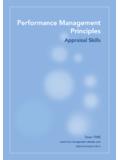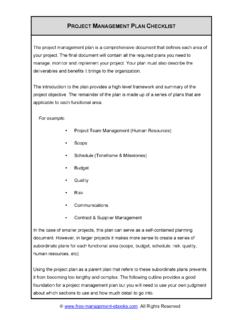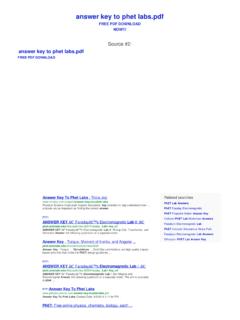Transcription of Accounting Principles - Free Management eBooks
1 Team FMEF inancial SkillsAccounting 978-1-62620-953-4 Copyright Notice 2013. All Rights ReservedISBN 978-1-62620-953-4 The material contained within this electronic publication is protected under International and Federal Copyright Laws and treaties, and as such any unauthorized reprint or use of this material is strictly may not copy, forward, or transfer this publication or any part of it, whether in elec-tronic or printed form, to another person, or or translation of any part of this work without the permission of the copy-right holder is against the downloading and use of this ebook requires, and is an indication of.
2 Your complete acceptance of these Terms of Use. You do not have any right to resell or give away part,or the whole, of this 978-1-62620-953-4 1 Accounting PrinciPleStable of contentsPreface 2 Visit Our Website 3 Introduction 4 Basic Accounting Concepts 6An Income Statement 6A Sample Simple Income Statement 7 Cash Accounting 9 The Limitations of Cash Accounting 11 Accrual Accounting 15 Basic Financial Terms 16 The Revenue Recognition Principle 19 The Matching Principle 22A Sample Income Statement Using the Accrual Method 23 Summary 28 Other free Resources 29 References 30 ISBN 978-1-62620-953-4 2 Accounting PrinciPleSPrefaceThis ebook explains all of the
3 Basic Accounting concepts and terminology you will need to understand the three primary financial statements that appear in every organization s annual report and most internal monthly reports. You will learn: The precise definition of essential Accounting terms The purpose of the income statement, balance sheet, and cash flow statement The differences between cash-based and accrual-based Accounting The revenue recognition principle and the matching principle How depreciation, prepayments, and bad debt are allowed forISBN 978-1-62620-953-4 3 Accounting PrinciPleSVisit our WebsiteMore free Management eBooks along with a series of essential templates and check-lists for managers are all available to download free of charge to your computer, iPad, or Amazon are adding new titles every month, so don t forget to check our website regularly for the latest ISBN 978-1-62620-953-4 4 Accounting PrinciPleSintroductionAs a manager.
4 You may be asked to produce or contribute towards an income statement for your own business unit. This provides senior Management with an indication of how your business unit is performing against its targets over a specific period, for example quarterly. In addition, you will usually be expected to understand simple financial reports and communicate effectively with financial people in your own ebook explains all of the basic Accounting concepts and terminology you will need to understand the three primary financial statements that appear in every organization s annual report and most internal monthly reports as well.
5 Income StatementBalance SheetStatement of Cash FlowPrimary Financial Statements are:These are: The Income Statement An Accounting of revenue, expenses, and profit for a given period. This can also be an internal document that can be used to make Management decisions about almost any activity where you have a record of the money spent and the associated return. The Balance Sheet An itemized statement that summarizes the assets and li-abilities of the business at a given date. The Statement of Cash Flow A report that shows the effect of all transactions that involved or influenced cash but did not appear on the income you work in a nonprofit sector then do not be put off by words like business and profit.
6 Even if your organization is not a business that exists to make a profit, it is still important to understand the basic Principles of finance and Management reporting so that you can monitor efficiency and control your budget effectively. ISBN 978-1-62620-953-4 5 Accounting PrinciPleSNonprofi t organizations need to managetheir fi nancial expenditure and do so using business terminologyYour organization may not be concerned with sales and profit as such, but there will be some metrics for measuring the service delivered and the costs incurred in delivering it.
7 Financial reporting requires an understanding of: basic financial terms, the differences between cash-based and accrual Accounting , and an appreciation of when revenue and costs are recognized. All of these topics are dealt with in this ebook , which is an ideal introduction to basic Accounting POINT 4 You should make sure that you know the basic concepts and terminology needed to understand income statements, balance sheets, and statements of cash flow as these are widely used, even by nonprofit 978-1-62620-953-4 6 Accounting PrinciPleSBasic Accounting concepts The basic Principles of Accounting are best understood by considering some simple busi-nesses and how they might document their financial Income StatementThis is a financial statement that measures an organization s financial performance over a specific Accounting period by giving a summary of how it incurs its revenues and ex-penses.
8 It also shows the net profit or loss incurred over that period and is often referred to as a Profit and Loss or Revenue and Expenses statement. Income StatementOperating Revenue & ExpensesNon-Operating Revenue & ExpensesAn income statement consists of two sections: operating and non-operating activities. The operating section details the revenue and expenses directly associated with business operations, for example the purchase of raw materials. The non-operating section details revenue and expenses that result from activi-ties outside of normal business operations, for example the sale of an office or land.
9 This division of revenue and expenses into operating and non-operating is particular to each organization and is dealt with in detail in the ebook Understanding Income State-ments, which you can download from For the moment we will use a simple income statement to illustrate the financial prin-ciples you need to be familiar with, since this type of income statement does not distin-guish between operating and non-operating revenues and 978-1-62620-953-4 7 Accounting PrinciPleSA Sample Simple Income StatementThis sample simple income statement covers a twelve-month period for Suzy s Signs, a one-person business that designs signage.
10 It details the amount of revenue and expense that comes in and goes out of the organization without distinguishing between operating and non-operating items. Income Statement terms:RevenueExpensesNet IncomeThe income statement uses three terms that can be defined as: Revenue incoming assets in return for sold goods or services. Expenses outgoing assets or liabilities incurred. Net Income the difference between Revenue and Expenses. This shows wheth-er you are generating a profit or you are operating at a loss. In our example, Suzy runs her own design agency called Suzy s Signs.

















